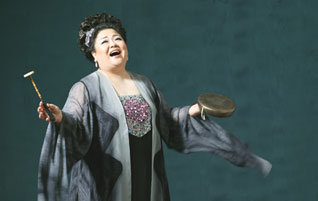Jazz Vocalist Yoon Hee-jung

Jazz vocalist Yoon Hee-jung brims over with energy and fervor. Every word she speaks is filled with her passion for jazz and music.
She says her motto is Be someone whom others would always be glad to see. The truth of this phrase is proven by the fans who cram the seats at her show, Yoon Hee-jung & Friends, which she has been putting on nearly every month since 1997. Designer Andre Kim, who frequently attends her shows, marvels, Those two hours just fly by.
Yoon has recently come out with a new album, C.E.O.J. Vol. 1. The title is short for Co-Edutainment of Jazz, signifying the melding of education and entertainment through jazz. The element of education seems rather unusual, but Yoon places special significance on what the word stands for.
Music is a choice. And education is the process of persuasion required for that choice. When youre persuaded, you begin to sympathize, and that leads to jazz becoming compulsory, necessary.
C.E.O.J. is Yoons first effort in her long devotion to popularizing jazz for the masses. Listening to the albums 15 tracks brings home the unique ambiguity of jazz: the blending of classical jazz and Korean traditional instruments like the kkwaenggwari and the taepyeongso, the freedom of her voice as it weaves in and out among the notes, the constant fluctuation between something akin to a form and complete formlessness In the early nineties, I was captivated by the tantalizing, shimmering heat haze of music that is jazz, she recalls. That got me started in my jazz career.
Adding that Korean musicians cannot help but create Koreanized jazz, she explains that her music attempts an alternative rhythm aimed at the international stage, by mixing in Korean traditional instruments and sounds.
The title track, Youd Be So Nice to Come Home to, is one of Cole Porters signature songs. Enlivened by a Latin mambo rhythm, it contains both passion and humor. Yoon, who personally adapted the lyrics to Korean, states, Even legendary jazz vocalists like Billie Holiday and Ella Fitzgerald said that the words accounted for 70 percent of the song. Vocalists must be able to vocalizeto put words to instrumental music.
Another track on the album, entitled Assi (Korean term of address equivalent to My Lady), is an adaptation of the theme song from a hit 70s drama series sung by Lee Mi-ja. Recast into English, this rendition has a new appeal and sensitivity for fans who remember Lees original. Y.H.J. Blues was penned by Yoons jazz mentor, Lee Pan-geun, and sets autobiographical content to music. Lee Jeong-siks saxophone, taepyeongso (a lively woodwind instrument), kkwaenggwari (a small hand-held gong), and various Latin instruments combine to produce a sound that recalls a vigorous round of nong-ak (percussion-oriented group music performed originally by farmers). The symphonic Afro Blue is a family affair, with Yoons daughter, Kim Soo-youn (who is a member of the Bubble Sisters), singing the chorus and her entrepreneur son, Kim Tae-hyun, voicing the rap portion.
Yoon debuted in 1972 with the song, Senoya Senoya, moved on to the Blues, then settled down to jazz in the early 90s. Now some 20 years into her love affair with jazz, Yoon declares, In good jazz, the musician intervenes through improvisation so that the melody disappears. I want to become a jazz singer who gives voice to the soul.
Yoon intends to continue releasing subsequent volumes in the C.E.O.J. series. More than 140 amateur jazz singers, including actor Park Sang-won and former National Assemblyman Hong Sa-deok, have already been educated through her show, Yoon Hee-jung & Friends. Fans who have seen her performance become supporters in her Jazz Culture Movement.
Jazz comes from human beings, and makes you more of a human being the more you listen to it. I want people to be humming jazz in all corners of this country.
Yeub Heo heo@donga.com







